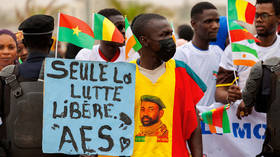West African bloc lifts sanctions on Sahel state
The restrictions were imposed following military coups in Niger, Burkina Faso, Mali, and Guinea over the past three years
The Economic Community of West African States (ECOWAS) is lifting sanctions imposed on Niger over last summer’s military coup, the president of the group’s commission, Omar Alieu Touray, announced on Saturday following a meeting at an ECOWAS summit in the Nigerian capital, Abuja.
A no-fly zone, border closures, the freezing of central bank and state assets, and the suspension of commercial transactions are among the sanctions to be lifted with immediate effect. According to Touray, this step is being taken “on purely humanitarian grounds” to ease the suffering caused as a result – though individual sanctions will remain in force.
The summit of the 15-nation economic bloc, which concluded on Saturday, attempted to address the threat of disintegration facing the region and to convince the military-led countries of Niger, Mali, and Burkina Faso to reconsider their decision to leave the group.
“We must re-examine our current approach to the quest for constitutional order in our member states,” Nigerian President Bola Tinubu, the current chairman of ECOWAS, said at the beginning of the summit.
Tinubu urged the three countries to “reconsider the decision” and said they should not perceive the organization “as the enemy.”
Earlier this week, ECOWAS co-founder and former Nigerian military leader General Yakubu Gowon called for the bloc to lift “all sanctions that have been imposed on Burkina Faso, Guinea, Mali and Niger.”
In January, Burkina Faso, Mali, and Niger announced that they were immediately withdrawing from ECOWAS over the “inhuman sanctions,” accusing the group of serving foreign interests and posing a threat to the countries.
The regional bloc had imposed sanctions on the three former French colonies to pressure them into restoring democratic rule after coups deposed their civilian governments.
The withdrawal may have a significant impact on the bloc’s remaining members, Nigerian lawyer Daniel Bwala, the spokesperson for the presidential candidate from the Peoples’ Democratic Party in the 2023 Nigerian election, told RT. He said West Africa is deeply interconnected, meaning the departure from ECOWAS by the three states will be felt across the region.
Andrey Maslov, the head of the Center for African Studies at Russia’s Higher School of Economics, believes that fewer ECOWAS members show interest in isolating Burkina Faso, Mali, and Niger now.
“Togo and Benin are becoming new transitional hubs for the landlocked Sahelian countries. A good example of that will be Niger starting its oil exports via Benin soon,” he told RT.
“Senegal will probably abstain from any harsh decisions given its current unstable situation at home and the anti-French sentiment of the population. As a result, Cote d’Ivoire risks finding itself isolated inside the bloc as France’s last loyal ally,” Maslov added.
You can share this story on social media:








Comments are closed.